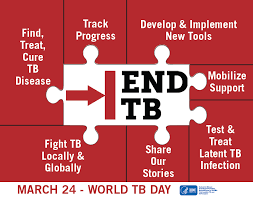Facts:
- TB is second only to HIV/AIDS as the greatest infectious killer disease worldwide
- India has the highest TB burden in the world, accounting for almost 25 per cent of global TB cases.
- India’s domestic budget for fighting tuberculosis showed a dramatic jump from about ₹700 crore in 2015 to ₹2,500 crore last year
- India has pledged to eradicate tuberculosis by 2025, five years ahead of global target set by WHO.
Basics about TB:
Tuberculosis is an infectious, airborne disease caused by the bacterium Mycobacterium tuberculosis. It mainly affects the lungs. It can be transmitted from person to person through the air when people with TB cough, sneeze, laugh or speak, spit, propelling the germs into the atmosphere
Why TB is an issue?
- With proper diagnosis and treatment, TB can be cured.
- However, too many people with TB don’t seek care for early symptoms and get properly diagnosed. Of those in whom the disease is detected, many do not complete their treatment.
- Despite global efforts to combat TB, which saved an estimated 53 million lives since 2000 and reduced TB mortality rate by 37%, the disease is still top infectious killer in 2016. The disease also has been reported to be main cause of deaths related to antimicrobial resistance and the leading killer of people with HIV.
- The biggest challenge was underreporting and underdiagnosis of TB cases, especially in countries with weak health systems and large unregulated private sectors.
‘90-90-90 target’ by 2035:
- The government has committed to achieve a ‘90-90-90 target’ by 2035 (90% reductions in incidence, mortality and catastrophic health expenditures due to TB).
- This is premised on improved diagnostics, shorter treatment courses, a better vaccine and comprehensive preventive strategies.
Moscow Declaration:
The declaration calls for eliminating additional deaths from HIV co-infection by 2020 and achieving synergy in coordinated action against Tuberculosis
and non-communicable diseases (NCDs). India is among signatories to the declaration. Moscow declaration emphasis need for fixing multi sectoral responsibility towards ending TB by 2035, the global target.
Collaborations:
- Indo-US partnership to free India of TB (see Indo-US relation).
- India has signed WTO’s call to end TB by 2030.
- USAID-India End TB Alliance
The government has envisioned following strategic steps to eliminate TB by 2025:
- A partnership with the private sector has been envisaged under Joint Effort for Elimination of Tuberculosis (JEET) for the elimination of TB by 2025, five years ahead of the global schedule.
- To increase the reporting from the private sector, public-private support agency approach has been initiated.
- Indian Medial Association has been roped in for large scale sensitization and advocacy with private practitioners with standardised digital material.
- States have been supplied anti-TB drugs to provide for TB patients notified from private sector based on demand.
- To ensure the TB patients are not deprived of DBT benefit flexibility to provide the benefit through the existing bank account of a blood relative has been given.
- States have also been advised to facilitate opening of zero balance accounts for TB patients, if necessary, under the PradhanMantri Jan DhanYojana (PMJDY) and Indian Postal Bank.
